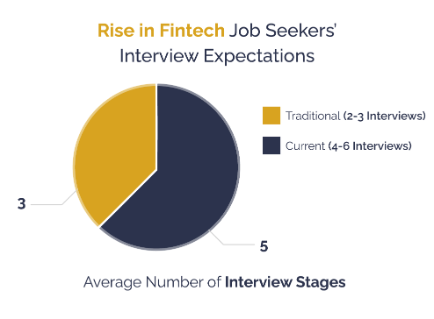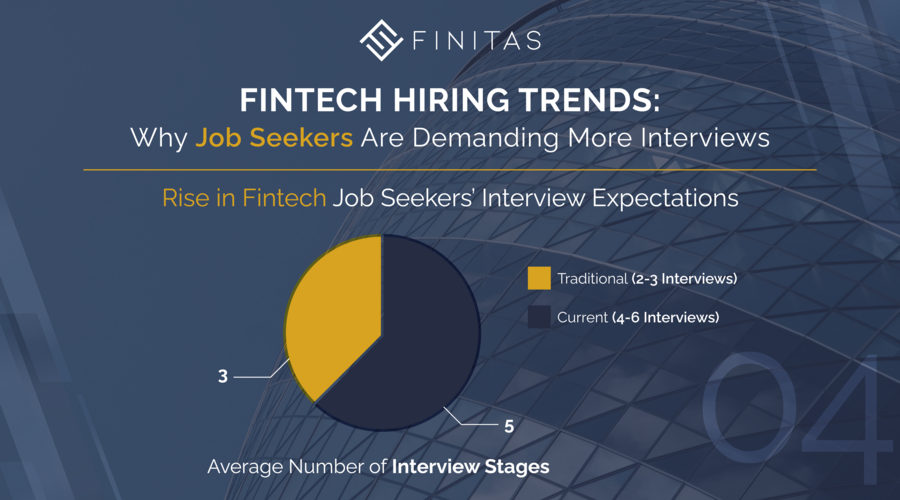In today’s competitive hiring landscape, job seekers are embracing a slower, more deliberate approach to securing their next role.
Gone are the days of quick decisions and 2-3 stage interview processes; candidates are now expecting 4-6 interviews before committing. This shift signals a fundamental change in priorities and a demand for greater clarity, stability, and alignment in their professional journeys.

Cautious Candidates in a Shifting Market
The recruitment landscape in Fintech has been reshaped by broader economic pressures. With funding plummeting in 2024, both companies and job seekers have become more cautious in their decision-making. Just as investors scrutinise opportunities more rigorously, candidates are doing the same when evaluating potential employers.
This heightened caution stems from key concerns:
Long-term viability: Candidates are taking the time to assess whether a company can weather economic uncertainty.
Cultural fit: With hybrid work and evolving workplace values (as discussed in our previous blog on workplace preferences), job seekers are prioritising environments that align with their personal and professional needs.
Market position: Understanding where a company stands against competitors has become a critical step in the decision-making process, especially in an industry as volatile as Fintech.
These factors highlight the importance of transparency, communication, and patience in modern hiring processes.
Why 4-6 Interviews?
The rise in interview expectations can be attributed to several factors:
Understanding the Value Proposition
Job seekers want to fully understand what a company offers beyond compensation. They’re asking deeper questions about career progression, work-life balance, and personal development opportunities—elements that weren’t as prominently emphasised in previous years.Evaluating Market Position
Candidates are looking closely at how a company positions itself in a crowded Fintech market. Is it innovating? Is it stable? With more options and more competition, job seekers are doing their due diligence.Ensuring a Cultural Match
Cultural fit has become a top priority, especially as hybrid working becomes the norm. Candidates want reassurance that the company’s values align with their own and that the working environment will support them in the long term.
The Impact on Recruitment Timelines
For companies, these extended processes present a new challenge. Longer recruitment timelines can delay decision-making and lead to increased competition for top talent. However, the key lies in balancing thoroughness with efficiency.
Here’s how businesses can adapt:
Streamline Multi-Stage Interviews
While candidates expect multiple touchpoints, this doesn’t mean every stage has to be lengthy or redundant. Consolidating assessments and ensuring each stage has a clear purpose can help reduce unnecessary delays.Enhance Communication
Candidates value transparency and regular updates. Proactively communicating timelines and the purpose of each stage reassures job seekers and strengthens the overall experience.Showcase Stability and Culture Early
Use early interactions to highlight the company’s strengths—market position, growth plans, and workplace culture. This builds confidence and allows candidates to evaluate their fit earlier in the process.
Navigating the New Normal
As discussed in our previous blogs on compensation trends and evolving workplace preferences, candidates are navigating a dramatically different job market. Employers must adapt to meet their changing expectations. While a cautious approach to hiring may feel like a challenge, it also represents an opportunity: companies that embrace transparency, clear communication, and a candidate-first mindset will ultimately attract top-tier talent in this competitive landscape.
Explore More from the Series
The Fall of the Bonus in Fintech: What Really Matters in Compensation Today
Workplace Preferences Have Evolved in Fintech: Why Hybrid is Here to Stay
What’s your take on the rise in interview expectations? Share your thoughts or reach out to discuss how your hiring processes can adapt to these shifting trends!



